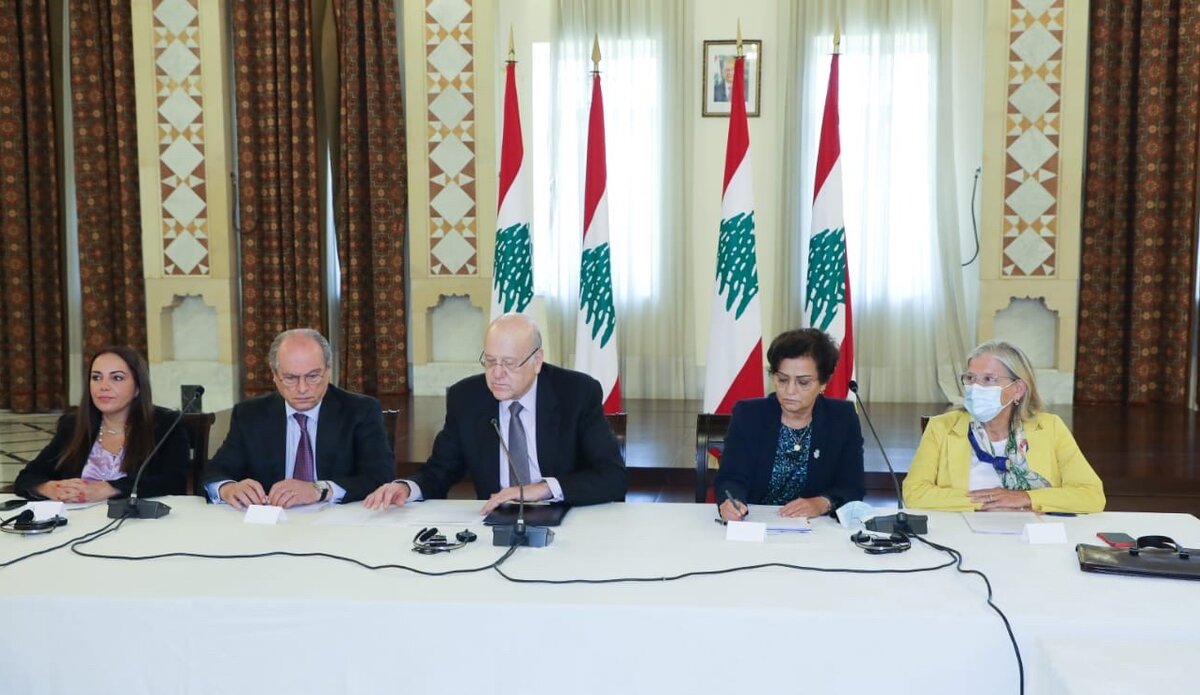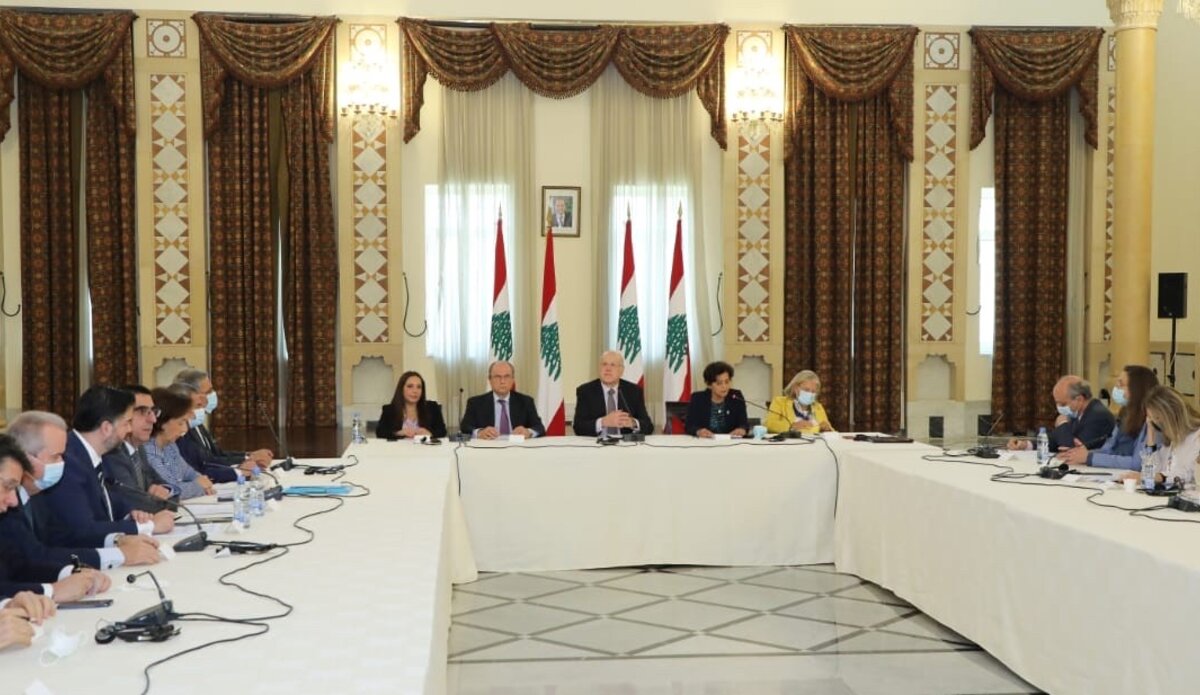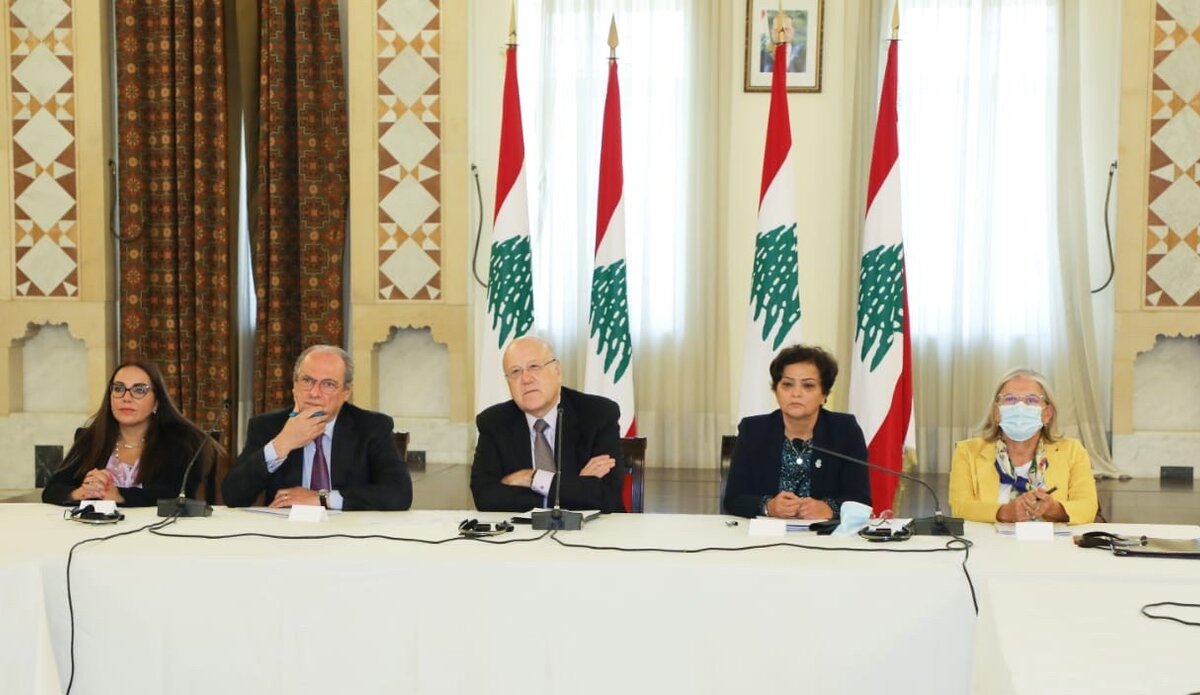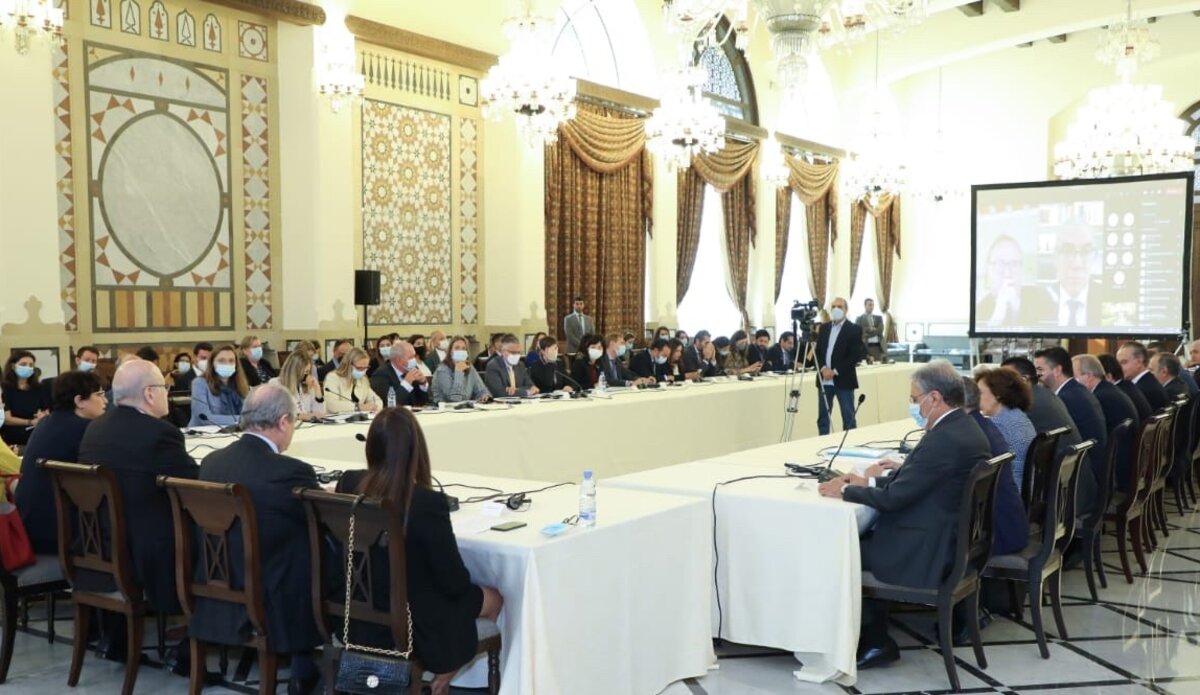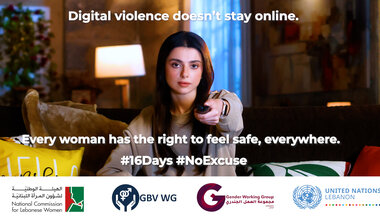Press Release & Co-Chairs Statement: Third Meeting of 3RF Consultative Group
PRESS RELEASE
Third Consultative Group Meeting
on the Reform, Recovery and Reconstruction Framework
Beirut, November 16, 2021 - The Consultative Group (CG) of the Reform, Recovery and Reconstruction Framework (3RF) held its third meeting earlier today.
The 3RF Consultative Group consists of the Government of Lebanon, Lebanese civil society, the European Union, United Nations, the World Bank and international donors. Together they monitor progress and give strategic direction to the reforms and activities under the 3RF.
The 3RF Consultative Group members discussed progress achieved so far and next steps in four main sectors: the anti-corruption sector; the Build Beirut Businesses Back Better (B5) programme; the social protection sector; and the housing sector. Below are the co-chairs’ statement of the third 3RF Consultative Group meeting and list of attendees.
The 3RF report and the Frequently Asked Questions (FAQ) on the 3RF can be found here.
Reform, Recovery and Reconstruction Framework
Third Consultative Group Meeting: Co-Chairs' Statement
- The third Consultative Group (CG) meeting of the Reform, Recovery and Reconstruction Framework (3RF) was held on 16 November 2021 at the Grand Serail, co-chaired by the Prime Minister of Lebanon, Lebanese civil society, European Union (EU) and United Nations (UN).
- The economic, financial and social situation of most Lebanese has deteriorated further since last meeting in July. More than half the population live below the national poverty line and an increasing share of households has difficulty accessing basic services. Rebuilding trust in the social contract is essential for people to know there is a future for them in Lebanon, especially for those bereaved after the blast and for women.
- The CG welcomed the formation of the new government, which took office on 10 September, and the ministerial statement that aligns with 3RF priorities. This commitment needs to be translated into concrete action and the Government and Parliament need to deliver on priority reforms. The CG welcomed the engagement of the Prime Minister, the Parliament, and the Presidency. The CG praised the formation of ministerial committees to further the work of the 3RF, and for being inclusive of civil society.
- The CG repeated its call for justice and accountability through a transparent, independent and credible investigation into the Beirut port explosion, and for upholding due judicial process.
- The CG reviewed progress on essential reforms discussed in the previous Consultative Group meeting. CG reiterated the need for macroeconomic and fiscal reforms, in the framework of an IMF programme, as sine qua non for stabilization and recovery of the economy of Lebanon. Potential benefits from the IMF Special Drawing Rights should be maximized. CG also reiterated the call for free and fair elections, to be held according to the electoral calendar provided by law and ensuring full representation and participation of women in the democratic process and in government. As called for at the second CG meeting, civil society is included in implementation of the 3RF at sector level.
- The CG focused on how Lebanese Government, Lebanese civil society and the international community are working together to deliver the commitments of the 3RF. The CG called for donors to contribute to the 3RF, through the LFF or bilateral programmes that contribute to 3RF commitments. Priority in the present phase is people-centred recovery. The following next steps will all be taken before the fourth Consultative Group early next year.
- In the housing sector (pillar Improving Services and Infrastructure), civil society was first to respond after the blast and continues to support those worst affected, though uneven attention is given to poor neighbourhoods. There is a need for a housing recovery strategy and action plan, linking housing to wider urban recovery while remaining sensitive to heritage, cultural life and the environment.
- The CG calls for a coordination planning unit for urban recovery in the office of the Governor of Beirut together with the Mayor of Beirut. This unit will coordinate with the Army Forward Emergency Room, civil society and the international community. The Governor of Beirut welcomed this proposal and will work with the 3RF housing working group to develop a Terms of Reference. The working group will also develop templates of contracts to protect both tenants and landlords.
- The CG called on Parliament to extend the hold on evections introduced by law 194 for an additional year. The CG also called on the Forward Emergency Room to share their data on reconstruction efforts, on the Directorate General of Antiquities and UNESCO to share their data on heritage housing, and on donors to share their data on housing recovery and reconstruction efforts.
- Social protection (pillar Social Protection, Inclusion and Culture) has seen the National Poverty Targeting Plan double to 36 000 extremely poor households; soon set to double again. In-kind assistance was provided to more than 300 000 families nation-wide affected by the economic crisis. Some 20 000 disabled beneficiaries will soon receive social grants. The CG reiterated the call for a transparent 2022 budget with strong funding for social protection.
- CG welcomes the Prime Minister’ decision to immediately implement the ESSN and form a ministerial committee on Social Protection and a technical committee to work on the national Social Protection strategy. The Minister of Social Affairs in coordination with concerned ministers will lead on reactivation of a structured dialogue on Social Protection, together with the Social Protection Coordination Forum that was set up for the 3RF. The CG called for the government to endorse the Social Protection Strategy. The CG called on Parliament for ratification of the convention of people with disabilities.
- The B5 was launched on 11 November and will start disbursing to SMEs in December, a major development in support of the pillar Jobs and Economic Opportunities.
- The CG welcomed commitment from Parliament to expedite passing of the Competition, Insolvency and Bankruptcy laws. The Minister of the Economy committed to finalize the implementation decree for the e-transaction law and develop a detailed action plan to deliver on the business environment strategy in coordination with the 3RF working group. The Government will simplify export procedures through ministerial letters. Parliament was requested to extend law 194 also to protect businesses affected by the blast.
- Anti-corruption (pillar Improving Governance and Accountability) progress was noted on formation of an inter-ministerial committee to implement the Public Procurement law. Parliament called on the international community for technical and financial support to draft ten decrees needed for the law to enter into force August 2022.
- CG welcomed the appointment of the Anti-Corruption Committee headed by Minister Riachi and requests all nominations and an adequate budget to be announced before the next CG. The CG welcomed Government and Parliament commitment to work with the 3RF Rule of Law working group to review drafts of the Independence of the Judiciary law and to request the assistance of the Venice Commission in finalizing the draft law.
- The CG praised civil society for self-organizing and for their constructive stance, channelling the expertise and energy of more than 150 civil society organizations and experts into the 3RF through concrete recommendations.
- The CG praised the Prime Minister’s decision to revitalize and expand the scope of the Central Management Unit (CMU) to act as coordination on international cooperation in Lebanon. The CMU will include three CSO and three donors and development partners and be located in the Office of the Prime Minister. Terms of Reference of the new CMU will be developed before the next CG.
- The CG saluted civil society and volunteers inside and outside Lebanon. Civil society is included in implementation of the 3RF at sector level. Fourteen sectoral working groups have been activated to bring together implementers and experts from the United Nations, the World Bank, the European Union and civil society. The CG welcomed Government commitment to have representation in each of the working groups before the next CG meeting, in addition to representatives from donors. These working groups serve to implement the 3RF commitments including structured reforms required to unlock resources. Only by engaging in an inclusive and constructive policy dialogue, can Lebanon overcome its challenges.
*******
بيان صحافي
الاجتماع الثالث للمجموعة الاستشارية لإطار الإصلاح والتعافي وإعادة الإعمار
بيروت، 16 تشرين الثاني، 2021 - عقدت المجموعة الاستشارية لإطار الإصلاح والتعافي وإعادة الإعمار (3RF)إجتماعها الثالث في وقت سابق اليوم.
وتتألف المجموعة الاستشارية من ممثلين عن الحكومة اللبنانية، والمجتمع المدني اللبناني، والاتحاد الأوروبي، والأمم المتحدة، والبنك الدولي، والجهات المانحة الدولية. ويرصد هؤلاء معاً التقدم المُحرَز ويعطون التوجيهات الاستراتيجية للإصلاحات والأنشطة ضمن إطار الإصلاح والتعافي وإعادة الإعمار.
وناقش أعضاء المجموعة التقدم الذي تم إحرازه حتى الآن والخطوات التالية في أربعة قطاعات رئيسية هي مكافحة الفساد؛ وبرنامج صندوق إعادة بناء مؤسسات الأعمال في بيروت على نحو أفضل B5؛ والحماية الاجتماعية؛ والإسكان. وفي ما يلي بيان الاجتماع الثالث للرؤساء المشاركين للمجموعة الاستشارية لإطار الإصلاح والتعافي وإعادة الإعمار وقائمة المشاركين.
يمكن الطلاع على تقرير الإصلاح والتعافي وإعادة الإعمار والأسئلة المتداولة حوله هنا.
***************
إطار الإصلاح والتعافي وإعادة الإعمار
الاجتماع الثالث للمجموعة الاستشارية: بيان الرؤساء المشاركين
- عقدت المجموعة الاستشارية لإطار الإصلاح والتعافي وإعادة الإعمار اجتماعها الثالث في 16 تشرين الثاني 2021 في السراي الكبير، برئاسة رئيس مجلس الوزراء اللبناني، وممثلين عن المجتمع المدني اللبناني، والاتحاد الأوروبي والأمم المتحدة.
- ازدادت الحالة الاقتصادية والمالية والاجتماعية لمعظم اللبنانيين تدهوراً منذ الاجتماع الأخير للمجموعة في شهر تموز الماضي. ويعيش أكثر من نصف السكان تحت خط الفقر الوطني وتواجه نسبة متزايدة من الأسر صعوبة في الحصول على الخدمات الأساسية. ومن الأساسي إعادة بناء الثقة في العقد الاجتماعي حتي يتمكن الناس من التطلع إلى ّ مستقبل لهم في لبنان، خصوصاً لمن تأثروا بالانفجار والنساء.
- رحبت المجموعة الاستشارية بتشكيل الحكومة الجديدة التي بدأت بممارسة مهامها في 10 أيلول، وببيانها الوزاري الذي يتوافق مع أولويات إطار الإصلاح والتعافي وإعادة الإعمار. وتوقفت عند ضرورة ترجمة هذا الالتزام إلى عمل ملموس حيث يتعين على الحكومة ومجلس النواب تنفيذ الإصلاحات ذات الأولوية. ورحبت المجموعة بمشاركة رئيس الوزراء ومجلس النواب ورئاسة الجمهورية، وأشادت بتشكيل اللجان الوزارية لتعزيز عمل إطار الإصلاح والتعافي وإعادة الإعمار، ولشمولها للمجتمع المدني.
- كررت المجموعة الاستشارية دعوتها إلى إحقاق العدالة والمساءلة من خلال إجراء تحقيق شفاف ومستقل وذو مصداقية في تفجير مرفأ بيروت، ودعم الإجراءات القضائية الواجبة.
- استعرضت المجموعة التقدم المحرز في الإصلاحات الأساسية التي نوقشت في اجتماعها السابق. وأكدت المجموعة على ضرورة تنفيذ الإصلاحات الاقتصادية الكلية والمالية، في إطار برنامج لصندوق النقد الدولي، كشرط لازم لتحقيق الاستقرار وتعافي الاقتصاد اللبناني. ولا بد من الاستفادة على أفضل وجه من حقوق السحب الخاصة لصندوق النقد الدولي. وكررت المجموعة الدعوة إلى إجراء انتخابات حرة ونزيهة بحسب الروزنامة الانتخابية التي ينصّ عليها القانون، وضمان التمثيل الكامل للنساء ومشاركتهن في العملية الديمقراطية وفي الحكومة. ووفق ما نادى به الاجتماع الثاني للمجموعة الاستشارية، يتم إشراك المجتمع المدني في عملية تنفيذ إطار الإصلاح والتعافي وإعادة الإعمار على مستوى القطاعات.
- ركزت المجموعة الاستشارية على كيفية عمل الحكومة اللبنانية والمجتمع المدني اللبناني والأسرة الدولية معاً لتنفيذ التزامات إطار الإصلاح والتعافي وإعادة الإعمار. ودعت المجموعة الجهات المانحة إلى المساهمة في الإطار من خلال الصندوق الإئتماني المخصص للبنان (LFF) أو برامج ثنائية تساهم في تحقيق التزامات الإطار. وتركز الأولوية في المرحلة الراهنة على التعافي المتمحور حول الأشخاص. وستُتخذ جميع الخطوات التالية قبل انعقاد الاجتماع الرابع للمجموعة الاستشارية في أوائل السنة المقبلة.
- في قطاع الإسكان (ضمن ركيزة تحسين الخدمات والبنية التحتية)، كان المجتمع المدني أول من استجاب بعد الانفجار ويستمر في دعم أشد المتضررين، ولو أنه يتم إيلاء اهتمام غير متكافئ للأحياء الفقيرة. وثمة حاجة إلى استراتيجية وخطة عمل للتعافي الإسكاني، تربط الاسكان بالتعافي المُدني الأوسع، مع المحافظة على التراث والحياة الثقافية والبيئة.
- تدعو المجموعة الاستشارية إلى إنشاء وحدة تخطيط مُنسّقة للتعافي المُدني في مكتب محافظ بيروت بالتعاون مع رئيس بلدية بيروت. وستنسِّق هذه الوحدة مع غرفة الطوارئ المتقدمة للجيش اللبناني والمجتمع المدني والأسرة الدولية. وقد رحب محافظ بيروت بهذا الاقتراح، وسيعمل مع مجموعة العمل المعنية بالإسكان التابعة لإطار الإصلاح والتعافي وإعادة الإعمار لوضع دفتر شروط. وستضع مجموعة العمل أيضاً نماذج عقود لحماية المستأجرين والمالكين على حد سواء.
- دعت المجموعة الاستشارية مجلس النواب إلى تمديد فترة تعليق عمليات الإخلاء التي ينص عليها القانون رقم 194 لسنة إضافية. كما دعت غرفة الطوارئ المتقدمة إلى مشاطرة بياناتها بشأن جهود إعادة الإعمار، والمديرية العامة للآثار واليونسكو إلى مشاطرة بياناتهما المتعلقة بالمساكن التراثية، والجهات المانحة إلى مشاطرة بياناتها بشأن جهود التعافي الإسكاني وإعادة الإعمار.
- على صعيد الحماية الاجتماعية (ضمن ركيزة الحماية الاجتماعية والشمولية والثقافة) تضاعف عدد الأسر المستفيدة من البرنامج الوطني لدعم الأسر الأكثر فقراً وبلغ 36 ألف أسرة بالغة الفقر، علماً بأنه من المتوقع أن يتضاعف هذا الرقم مجدداً. وتم تقديم مساعدات عينية إلى أكثر من 300 ألف أسرة متضررة على نطاق البلاد من جراء الأزمة الاقتصادية. وسينال نحو 20 ألف مستفيد من ذوي الحاجات الخاصة قريباً منحاً اجتماعية. وكررت المجموعة الاستشارية الدعوة إلى اعتماد موازنة شفافة لعام 2022 مع مخصصات كبيرة للحماية الاجتماعية.
- ترحب المجموعة بقرار رئيس مجلس الوزراء بالتنفيذ الفوري لمشروع شبكة الأمان الاجتماعي (ESSN) وتشكيل لجنة وزارية حول الحماية الاجتماعية ولجنة فنية للعمل على الاستراتيجية الوطنية للحماية الاجتماعية. وسيتولى وزير الشؤون الاجتماعية بالتعاون مع الوزراء المختصين إعادة تنشيط الحوار المنظم بشأن الحماية الاجتماعية، إلى جانب منتدى تنسيق الحماية الاجتماعية الذي أنشئ خصيصاً لإطار الإصلاح والتعافي وإعادة الإعمار. ودعت المجموعة الاستشارية الحكومة إلى الموافقة على استراتيجية الحماية الاجتماعية. كما دعت المجموعة مجلس النواب إلى المصادقة على اتفاقية الأشخاص من ذوي الإعاقة.
- تم إطلاق برنامج صندوق إعادة بناء مؤسسات الأعمال في بيروت على نحو أفضل B5 في 11 تشرين الثاني وسيبدأ بصرف المنح للمؤسسات الميكروية والصغيرة الحجم في كانون الأول المقبل، وهو تطور كبير لدعم ركيزة فرص العمل والتعافي الاقتصادي.
- رحبت المجموعة الاستشارية بالتزام مجلس النواب بالإسراع بإقرار قوانين المنافسة والإعسار والإفلاس. وتعهد وزير الاقتصاد بإنجاز مرسوم تنفيذ قانون المعاملات الإلكترونية ووضع خطة عمل مفصلة لتنفيذ استراتيجية بيئة الأعمال بالتنسيق مع مجموعة عمل إطار الإصلاح والتعافي وإعادة الإعمار. وستبسِّط الحكومة إجراءات التصدير من خلال رسائل وزارية. وطُلب من مجلس النواب أيضاً توسيع نطاق القانون 194 لحماية الأعمال المتأثرة بالانفجار.
- لوحظ تحقيق تقدم على صعيد مكافحة الفساد (ضمن ركيزة تحسين الحوكمة والمساءلة) من خلال تشكيل لجنة وزارية لتنفيذ قانون الشراء العام. ودعا مجلس النواب الأسرة الدولية إلى توفير دعم فني ومالي لصياغة عشرة مراسيم لازمة لدخول القانون حيز التنفيذ في آب 2022.
- رحبت المجموعة الاستشارية بتعيين هيئة مكافحة الفساد برئاسة وزيرة الدولة لشؤون التنمية الإدارية نجلا رياشي وطلبت إعلان جميع الترشيحات واعتماد الموازنة المناسبة قبل الاجتماع المقبل للمجموعة. ورحبت المجموعة بالتزام الحكومة ومجلس النواب بالعمل مع مجموعة العمل المعنية بسيادة القانون التابعة لإطار الإصلاح والتعافي وإعادة الإعمار لمراجعة مشروع قانون استقلالية القضاء وطلب مساعدة لجنة البندقية في إتمام مشروع القانون.
- أشادت المجموعة الاستشارية بجهود التنظيم الذاتي للمجتمع المدني اللبناني وبموقفه البناء، وتوفير الخبرة والطاقة لأكثر من 150 منظمة مجتمع مدني وخبير لإطار الإصلاح والتعافي وإعادة الإعمار من خلال توصيات ملموسة.
- أشادت المجموعة الاستشارية بقرار رئيس مجلس الوزراء بتفعيل وتوسيع نطاق وحدة الإدارة المركزية للعمل على تنسيق التعاون الدولي في لبنان. وستضم وحدة الإدارة المركزية ممثلين عن ثلاث منظمات مجتمع مدني وثلاثة مانحين وشركاء تنمية على أن يكون مقرها في مكتب رئيس مجلس الوزراء. وسيتم إعداد دفتر شروط هذه الوحدة لعرضه على الاجتماع المقبل للمجموعة الاستشارية.
- حيّت المجموعة الاستشارية المجتمع المدني والمتطوعين داخل لبنان وخارجه. ويُدرج المجتمع المدني في تنفيذ إطار الإصلاح والتعافي وإعادة الإعمار على مستوى القطاعات. وجرى تفعيل أربع عشرة مجموعة عمل قطاعية للجمع بين المنفذين والخبراء من الأمم المتحدة والبنك الدولي والاتحاد الأوروبي والمجتمع المدني. ورحبت المجموعة الاستشارية بالتزام الحكومة بتسمية ممثلين عنها في كل من مجموعات العمل هذه قبل الاجتماع المقبل للمجموعة الاستشارية، بالإضافة إلى ممثلي الجهات المانحة. وتعمل مجموعات العمل هذه على تنفيذ التزامات إطار الإصلاح والتعافي وإعادة الإعمار، بما في ذلك الإصلاحات الهيكلية اللازمة للاستفادة من الموارد. ولن يتسنى للبنان أن يتغلب على تحدياته إلا من خلال المشاركة في حوار حول السياسات يكون شاملاً وبناء.
 UN
UN
